Achieve your sustainability goals by learning how to avoid sending your business waste to landfill.
Zero Waste isn’t just a concept or a novel idea; it is achievable and could be easier that you think…
Zero Waste is based on a waste producer doing as much as they practicably can to avoid sending waste to landfill. We realise this may seem like a daunting task which will present major challenges, either through perception and / or practicality. We break all these down into realistic and achievable goals to enable us to measure success and provide the traceability required to authenticate results.
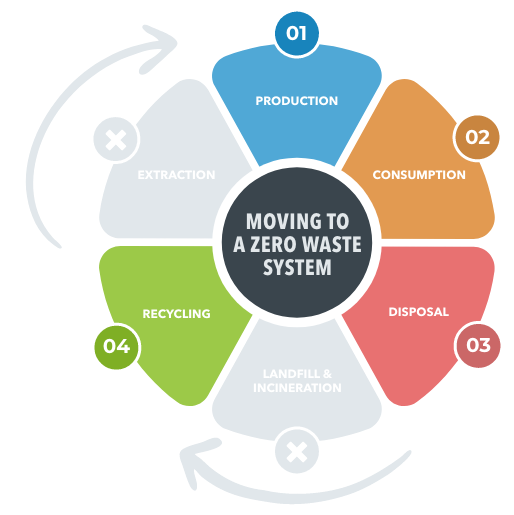

All we need to do initially is to carry out an initial site audit to review all the wastes you generate, its purpose and internal logistics. We then provide the consultancy services necessary thereafter to create your own ‘Road Map’ setting out your journey step by step until achieving the ultimate objective.
Applying the waste hierarchy isn’t just good for the environment, its good for your businesses bottom line.
Every day businesses are ‘wasting’ profits from the waste it produces. Waste is often the unseen and unnecessary cost because most businesses are so focussed on production. Many are unaware whereas others are just unsure of how to go about tackling the issue.
It starts with a shift in mindset and a move away from ‘waste’ as being seen as just a ‘waste’ and more along the lines of being a ‘resource’. Ultimately you pay for the product which enters your business and then again after it has served its use and needs to be disposed of.
Waste is only a waste when it ends up in a hole in the ground and serves no further use. If however, it finds an another use, an alternative use, or becomes a new product then can be a resource to someone else.
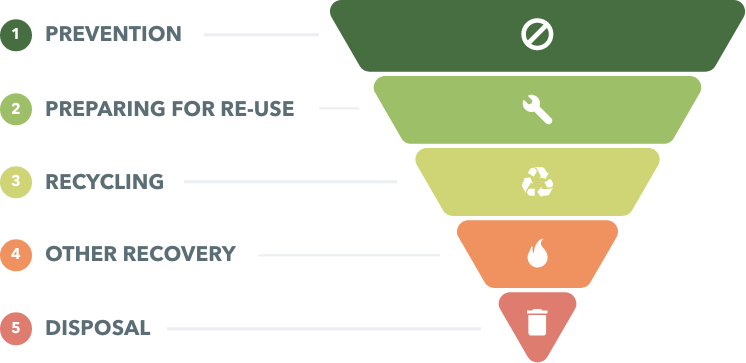

The best way for us to help you implement your waste hierarchy is for us to carry out an onsite waste audit to review not just the wastes you produce, but its use and your operations before beginning to apply the principles of prevention in a relevant manner. Very often people may suggest ‘board room ideas’ which sound great, but are not practical or workable on the ground so its important we learn more about your business before making recommendations.
We provide a unique re-use programme and can source leading edge solutions in finding new uses for really unusual ‘wastes’! If you have any items about to be disposed due to refurbishment, upgrade, re-fit-out or even a change in branding we would love to hear from you. Some of the solutions we have sourced have created some really special and unique Corporate Social Responsibility initiatives and demonstrated how a local Circular Economy can work to the benefit of so many.
It’s only after you have minimised all waste where practicable that we go about helping to ensure as much of the rest can be recycled – whereas so often people believe it is the penultimate.
Did you know the Waste Hierarchy is part of UK and EU environmental legislation meaning business are required by law to apply the waste hierarchy to the waste it produces!?
Every day of our lives we buy or use something once and either throw it or its packaging away. We all do it, it’s how the society we have been born into functions.
We take, make and dispose which is called the Linear Economy used more or less since the Industrial Revolution, although not exclusively.
Some of us remember running around as kids lifting all the glass soda bottles we could find and selling them back to the shops and getting enough money to eat enough sweets for a week (but finishing them in a day!).
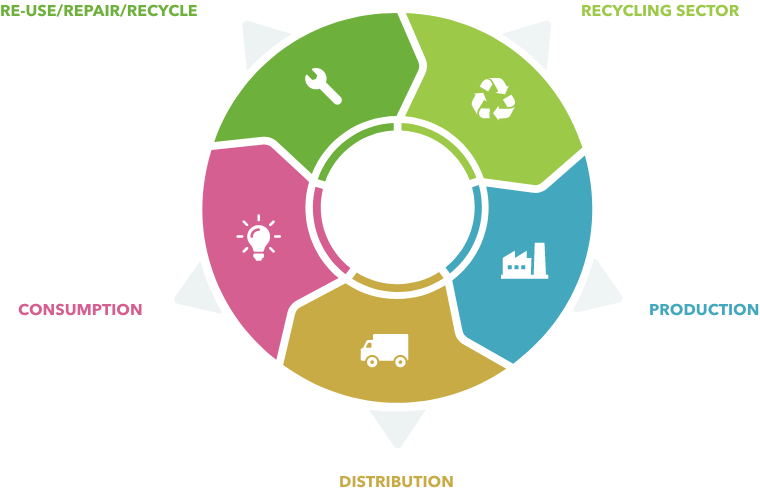

That model, irrespective of its motives back then is very similar to the Circular Economy we need to incorporate in to our professional and personal lives. It is designing products intended to last.
Using materials which are environmentally friendly in to production and distribution and then keeping them in use for as long as possible, where you effectively apply the waste hierarchy until you reach recycling, where the cycle repeats itself within a closed loop.
Transitioning to a Circular Economy should not be seen by large or small businesses; organisations or individuals as negative or troublesome, it should be embraced as an alternative model that builds longer term resilience and generates business and economic opportunities whilst benefitting the environment as the uncertainties of climate change become more prevalent.
The good news is this isn’t something for the future. It exists right now. We know it works and we get to see the benefits it can bring across society.
It is one of the most rewarding aspects of what we do and we would love to have a conversation with you to discuss how we can help you join in our
At Envirogreen we are serious about playing a leading role in helping Irish Society transform into a more progressive and socially conscious country. This expands beyond recycling, waste management and the environment.
The United Nations (UN) Sustainable Development Goals are a collection of 17 global goals designed to be a “blueprint to achieve a better and more sustainable future for all” and build on decades of work by countries and the UN. Adopted by UN member states in September 2015, the SDGs will shape government, business and civil society priorities to 2030.
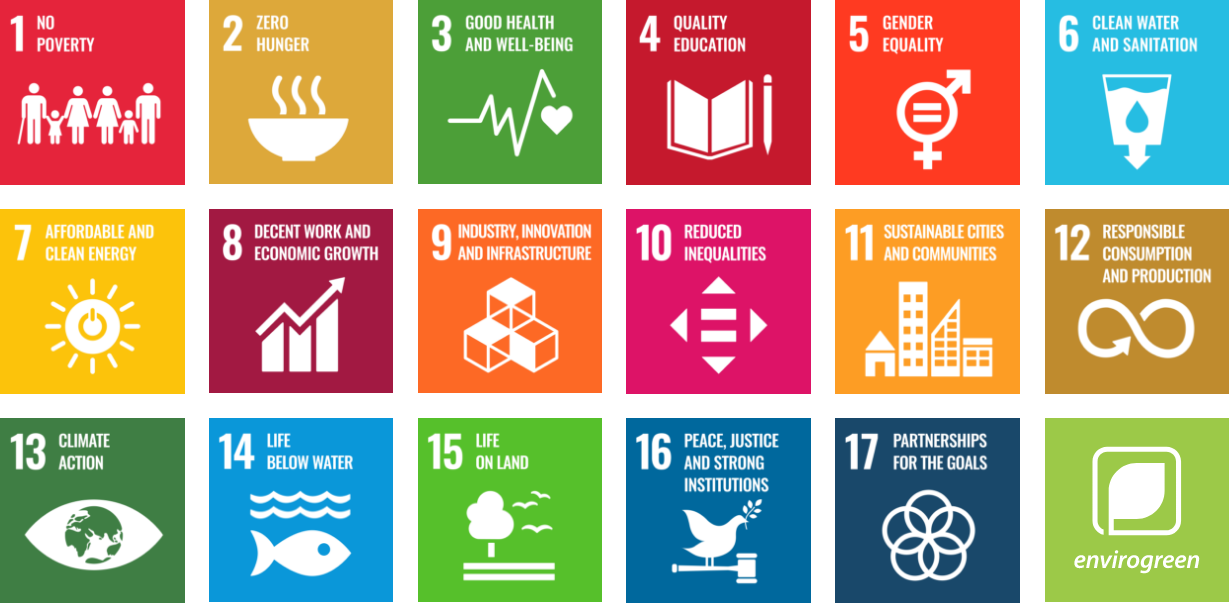

To turn the SDG’s into reality, a broad ownership and strong commitment is required from all stakeholders. This includes national governments, local authorities, large and small businesses, private and charitable organisations, individuals and trade unions.
Sustainability has been at the heart of our core business objectives since inception, we realise there is still so much more we can do.

That is why we have committed to mapping our business operations to achieving each relevant goal.
It wasn’t that long ago the only issue anyone really heard about with plastic waste was confined to it being buried in landfills for hundreds of years because they don’t biodegrade, now it is everywhere!
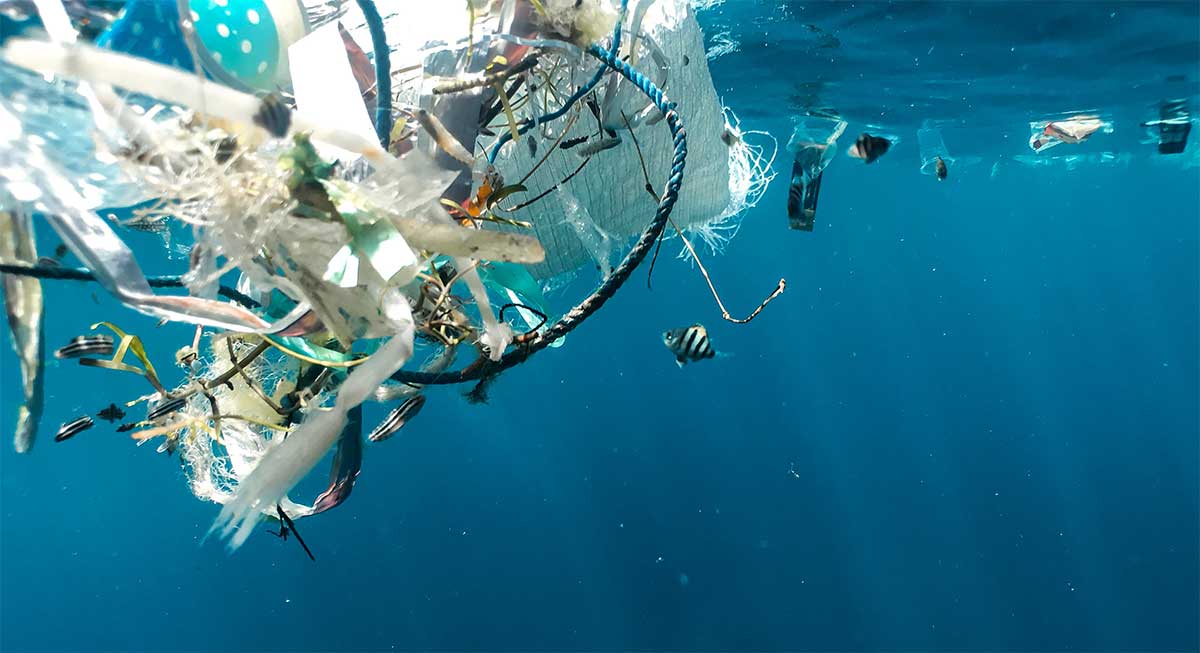

It has very rapidly spread to every part of our living planet; in oceans, the air and on land; in our water systems, wildlife and human life. Plastic pollution in oceans is:
- In the North Pacific, a gyre or slowly swirling whirpool of ocean currents collects plastic debris. It is estimated to be twice the size of France which could double in size within 10 years if we don’t change our ways – Plastic Pollution – Facts and Figures • Surfers Against Sewage (sas.org.uk)
- Scientists have documented 700 marine species affected by ocean plastic – Key Facts About Plastic Pollution – Greenpeace USA
- And 1 million are killed – Plastic Pollution Facts
When you consider 50% of all plastic produced is for single use purposes – used literally for up to a few minutes and then thrown away its impact becomes even more galling.
There is growing pressure on packaging producers to apply the waste hierarchy and eliminate packaging where possible, reduce single-use packaging, use materials which are recyclable for its products and which is made using recyclable content. This incidentally brings it closer to the Circular Economy Model and is further proof of why there is such an urgent need for us all to change our ways.
Envirogreen recycles up to 80 different types of plastics every week and are one of the largest handlers of plastics throughout Ireland.
We can help you achieve your targets or aspirations in to adopting any of the Sustainability models outlined within this section.